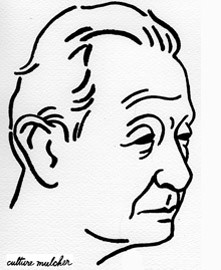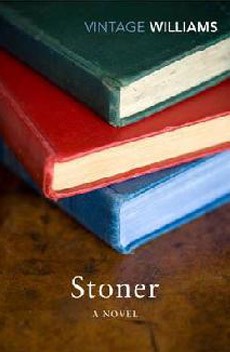By Jim Morgan
It is not every day a perfect or nearly perfect novel is written, yet here are two — one American, one Australian — with some claim to that level of creative perfection, now fortunately in their second lives. These are both exceptional works in their simplicity, directness and lack of subterfuge.
 The American is Stoner by John Williams, first published by Viking Press in 1965, then reissued by New York Review Books Classics in 2006, and again last year by Vintage Classics. (Writing in the New York Times in 2007, Morris Dickstein called Stoner ‘something rarer than a great novel — it is a perfect novel, so well told and beautifully written, so deeply moving, that it takes your breath away.’)
The American is Stoner by John Williams, first published by Viking Press in 1965, then reissued by New York Review Books Classics in 2006, and again last year by Vintage Classics. (Writing in the New York Times in 2007, Morris Dickstein called Stoner ‘something rarer than a great novel — it is a perfect novel, so well told and beautifully written, so deeply moving, that it takes your breath away.’)
Stoner is not, as one might think, about a Burroughsesque junkie, but its title character William Stoner, an agriculture student who ends up an “undistinguished English professor … at a drab Midwestern university.” As the Guardian review put it, ‘Williams renders an invisible life lustrous in all its quotidian triumphs and tragedies.’
I have some connection with the author Williams and his simple farming background, having started from scratch with no paid help for the first five years, rather confined to the advice of neighbours and a small dog-eared and bloody volume, Pearce’s Stock and Station Management, without which no blow was struck — so that I would emerge from the woolshed after an hour or so with my management and husbandry bible in one hand opened on the bloodstained page 169 and an enamel plate in the other bearing the pristine liver of the late hogget.
Williams strayed from agronomy into what was inescapable for him, the study of English Literature in its purest form, living out and describing in his prose the male rivalries of academic life and the unadulterated joy of the subtler entanglements between the sexes, and that of a father-daughter relationship, in the clear prose that won him a US National Book Award in 1972.
The Australian of the two is The Young Desire It by Kenneth Mackenzie, published in 1937, to which David Malouf has recently chosen to award his imprimatur as ‘nearly perfect’, a good call — that “nearly”: only spoiled for me by Mackenzie’s youthful excess in his choice of title, both pretentious and perhaps a little yuckie for my jaundiced ear.
From David Malouf’s introduction: ‘The Young Desire It is a miracle, not least in that its wholeness, its freshness and clarity, seem magically untouched by the damage that casts such a shadow over Mackenzie’s later years. Among Australian novels it is unique and very nearly perfect, a hymn to youth, to life, to sexual freedom and moral independence, written in full awareness — and this is a second miracle — of the cost, both to others and to oneself.’
 Born ten years earlier than Williams on the other side of the world, in West Australia, Mackenzie had left school, shifted his attention to the girl next door in a rural context, finished his novel in some glory, fathered a son, struggled with his health and alcoholism and tragically drowned swimming in 1955, as did his son some years later. Astonishingly, he was only 23 when The Young Desire It was published in London, to great acclaim, winning that year’s Australian Literature Society Gold Medal. And out of print and lost to us for years, until now.
Born ten years earlier than Williams on the other side of the world, in West Australia, Mackenzie had left school, shifted his attention to the girl next door in a rural context, finished his novel in some glory, fathered a son, struggled with his health and alcoholism and tragically drowned swimming in 1955, as did his son some years later. Astonishingly, he was only 23 when The Young Desire It was published in London, to great acclaim, winning that year’s Australian Literature Society Gold Medal. And out of print and lost to us for years, until now.
EVENTS:
Sydney 12 Sept 7pm: In a one-off Sydney event, David Malouf, James Bradley and Delia Falconer discuss the impact of this Australian Classic, with publisher Michael Heyward. Details here.
Melbourne, 19 Sept, 6:30pm: Join novelists David Malouf and Joan London in conversation with Peter Rose as they discuss The Young Desire It, at the Cinema Nova. (Details here.)
+ + +
 Guest reviewer, James Waite Morgan, ex-pastoralist and novelist: Parakeet, Loving Helen, The Artist’s Wife, Fat of the Land — is the biographer of his grandparents, S.A. men in The Premier and the Pastoralist.
Guest reviewer, James Waite Morgan, ex-pastoralist and novelist: Parakeet, Loving Helen, The Artist’s Wife, Fat of the Land — is the biographer of his grandparents, S.A. men in The Premier and the Pastoralist.









Crikey is committed to hosting lively discussions. Help us keep the conversation useful, interesting and welcoming. We aim to publish comments quickly in the interest of promoting robust conversation, but we’re a small team and we deploy filters to protect against legal risk. Occasionally your comment may be held up while we review, but we’re working as fast as we can to keep the conversation rolling.
The Crikey comment section is members-only content. Please subscribe to leave a comment.
The Crikey comment section is members-only content. Please login to leave a comment.